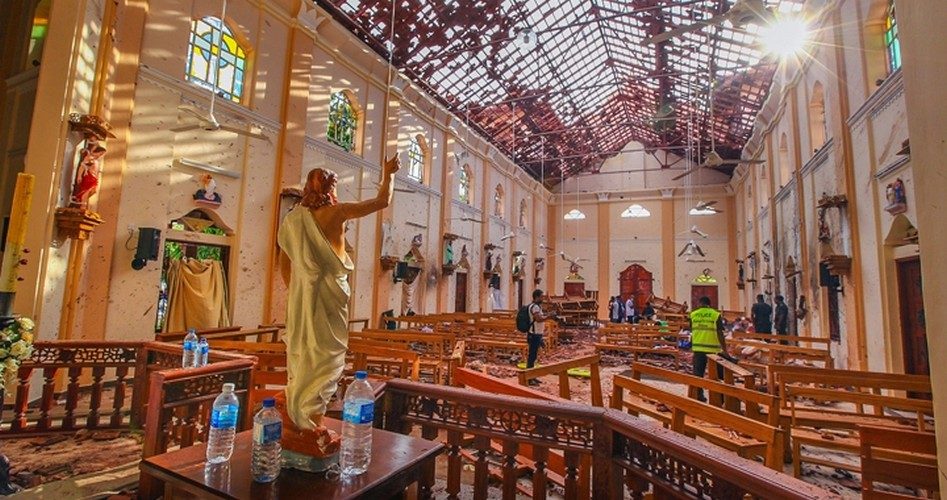
Easter Sunday — the day that Christians worldwide celebrate in a special way the resurrection of Jesus Christ from a tomb near Jerusalem almost 2,000 years ago — was the occasion for six clearly coordinated attacks upon three hotels and three churches in Sri Lanka, an island country in south Asia, located in the Indian Ocean. While Sri Lanka gives Buddhism a “special place” in its constitution, other religions are allowed to operate freely.
Apparently, to cite U.S. Representative Ilhan Omar (D-Minn.), “some people did something.” The problem is that “some people” keep doing “something,” but the American media does its best to under-report it. In Sri Lanka, what “some people did” was attack St. Anthony’s Shrine — a Catholic church — and three hotels in Colombo — the Cinnamon Grand, Shangri-La, and Kingsbury — along with another Catholic church in Negombo, St. Sebastian. Negombo is about 23 miles north of Colombo.
The attackers were evidently attacking Christian churches in general — not just Catholic — because 190 miles to the east, the Protestant Zion Church in Batticaloa was also attacked.
In all, more than 200 people were killed and over 400 were wounded in a total of eight bomb blasts on Easter Sunday. Worshippers and hotel guests alike were murdered after bombs collapsed ceilings and blew out windows.
“People were being dragged out,” said Bhanuka Harischandra of Colombo. Harischandra, a tech company founder, was going to a meeting in the city’s Shangri-La Hotel when it was bombed. “People didn’t know what was going on. There was blood everywhere.”
At least 27 foreigners were killed in the nearly-simultaneous bombing attacks, with several Americans feared among those slain.
The Archbishop of Colombo, Cardinal Malcolm Ranjith, said, “only animals can behave like that.”
If so, then there are lots of “animals” in the world today, because Christians are being persecuted, attacked, and murdered in numbers not seen in years. According to Open Doors, which tracks the numbers involved in Christian persecutions, “Today, just like in the book of Acts, Christians are persecuted all over the world for following Jesus.”
Every month, according to statistics compiled by Open Doors, 345 Christians are killed for faith-related reasons, and 105 churches and other Christian buildings are burned or attacked. Worldwide, one out of nine Christians experiences high levels of persecution.
While North Korea is rated the most dangerous country for Christians (for the 18th consecutive year), Islamic oppression is behind the persecution of Christians in eight of the 10 worst countries. In Muslim-majority countries, Christians are discriminated against for jobs, violently attacked, or even killed.
And it is not just Muslims attacking Christians. Hindu nationalists in India frequently assault Christians, usually with no consequences from official authorities. And in the officially atheistic communist-controlled nation of China, Xi Jinping, the nation’s strongman, is increasingly hostile toward Christians. Vietnam has also stepped up its persecution in recent years.
In just 2019 alone, according to Open Doors, 4,136 Christians have been killed for faith-related reasons, and 1,266 church buildings and other Christian buildings have been attacked. Not unreasonably, when the historic cathedral of Notre Dame was set ablaze in Paris, many assumed it was a deliberate attack of arson.
Political commentator David Horowitz has recently written about the rising level of persecution in his new book Dark Agenda. Horowitz recently asserted, “The Easter massacre of Christians by radical Muslim jihadists in Sri Lanka is but the bloody tip of a genocidal crusade which has taken the lives of hundreds of thousands of Christian innocents since 9/11.”
Very little has been reported in the mainstream press about this ongoing persecution of Christians. The oldest Christian community in the world — found in Iraq — was wiped out by Islamists. The Christians there were either massacred, or the survivors felt it best to leave the country.
As Horowitz said, “The Christian temple in Mosul had featured Sunday sermons continuously since the time of St. Paul. It is silent now.”
In contrast, persecution of Christians in America pales in comparison to what has gone on in recent years in other parts of the world. And yet, even in the United States, a nation which has long prided itself in its religious liberty and has been seen as a refuge for people of the Jewish faith, for example, has seen a rising tide of discrimination against persons of the Christian faith. Judicial and executive branch nominees have even had their Christian faith questioned by congressional committees.
The mayor of South Bend, Indiana, Pete Buttigieg, sensing that taking verbal shots at Christians is now a way to corral votes — at least in the Democratic Party primaries — has fired several verbal volleys at Vice President Mike Pence, all because of Pence’s Christian worldview.
This pattern of anti-Christian bias goes largely under-reported or mis-reported by the American media. While foreign Christian communities have been eliminated, the press in this country has said little to nothing. And inside the country, calls to reject presidential nominees to the federal bench or to the executive branch simply because of their religion has precipitated practically no condemnation at all from the national media. If anything, it is the Christians who are cast as the villains in their articles.
If the attacks in Sri Lanka had been on three mosques, there is no question the media in America would have made it a bigger story than they chose to do after murderous bombings on Christian targets. All attacks on all people, including Muslims in mosques, should be roundly condemned. But the rising wave of attacks upon Christians around the world is a story that our media is mostly missing, either because of incompetence or something worse.
Photo: AP Images



